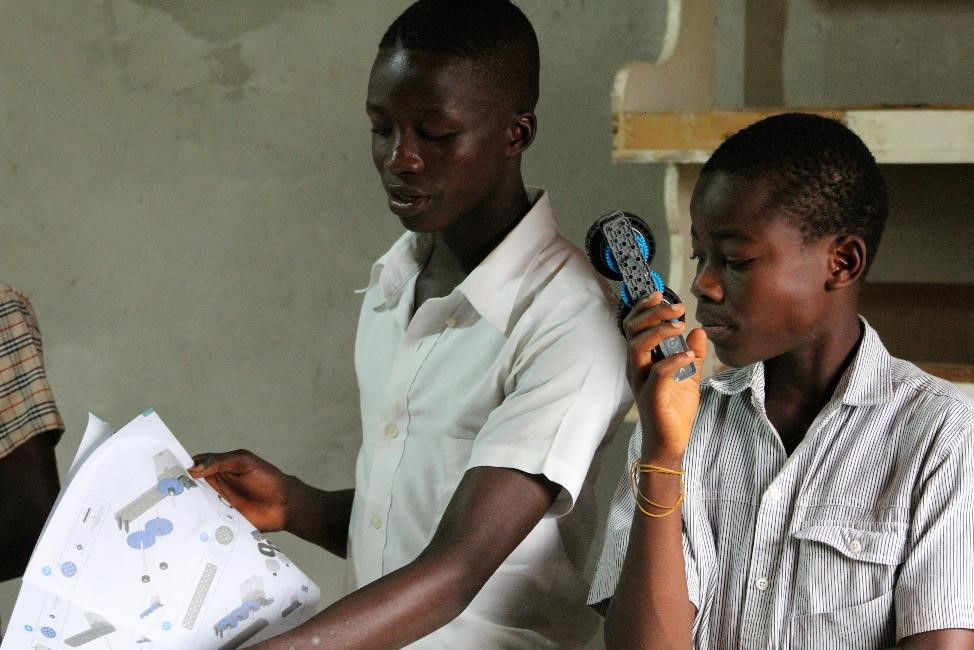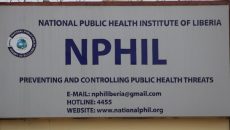BUCHANAN, Grand Bassa – On September 19th, students at the Buchanan Demonstration Elementary School and the World Wide Academy will return to school to learn new concepts that most Liberian university students never dream of encountering.
More than 150 fourth to seventh graders at the two schools will receive education in an enhanced science curriculum fortified with components of mathematics, engineering, and technology. The students are expected to learn how to solve problems working under constraints by transforming their ideas into reality and building prototypes.
At the center of the curriculum is a robotics platform used in 32 different countries – VEX IQ. Besides learning about the various engineering and physics principles, students will also be immersed in a program that will teach them about algorithms and computers, including a simplified computer programming interface based on C+, a widely used computer language.
The enhancement in the curriculum is all part of a program called Wahjay-STEM, for science, technology, engineering, and mathematics. Founder Giewee Giah, a first generation Liberian-American, said she decided to start the program because of problems she identified in Liberia.
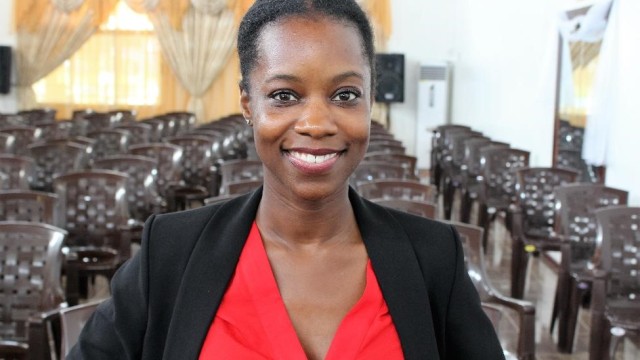
Giewee Giah, Founder of Wahjay-STEM. Photo: Jefferson Krua
Giah said the high unemployment rates in Liberia “disturbed†her, especially considering the presence of highly technical companies in industries such as oil and gas, rubber, and mining.
She continued, “The people who need to fill those roles are not always available locally, so companies are investing high amounts of money in order to appropriate expatriates, and Liberians are missing that opportunity. They are only able to grab the low-hanging fruits that’s there – which are the service positions that don’t pay well.â€
With a bachelor’s degree in mathematics and two master’s degrees in actuarial science and data science, Giah describes herself as having a “natural affinity towards sciences of logic.†Accordingly, it did not take long for her to identify the root cause as education. Specifically, one grounded in STEM principles.
Last week, the program was on display when Giah held orientation sessions for teachers along a few students invited to participate. She showed an episode of the American cartoon show, “The Magic School Bus,†which explained the inner workings of computers. Her interactive method had students explaining that the CPU was the “brain†of a computer and they even knew that it stands for central processing unit.
It was not just an infusion of STEM education, but a different method of teaching that encouraged critical thinking. Just as she practiced, Giah instructed the teachers to let the children discover things for themselves, only helping them when they needed it.
Undoubtedly, many children appeared uneasy this way of running a classroom – a method that seemed much more engaging than the typical way Liberian schools engage in rote memorization and regurgitation of information. Articulating their thoughts also did not come by easily as most students had limited vocabulary and at times, were put off by Giah’s Americanized Liberian accent.
But Giah’s patience seemed to be paying dividends. After challenging one student to explain a task as simple as playing football, she asked him to identify any challenges he may encounter while playing football and to brainstorm potential solutions.
Pleased with his responses, she turned to the class and said, “What your friend just did is called critically thinking. It means to take an idea and break it into pieces.â€
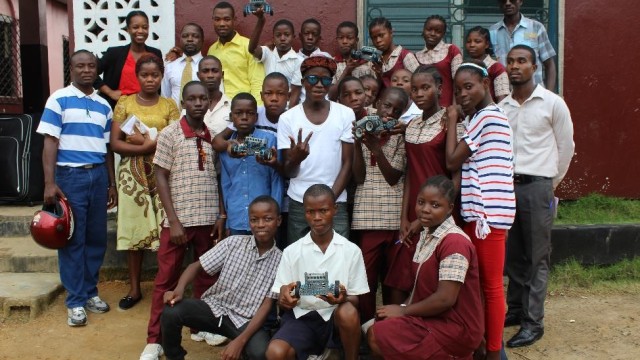
Teachers and students pose at the World Wide Academy campus. Photo: Jefferson Krua
While Giah is well suited for this environment, the success of the program will depend on the teachers’ ability to incorporate her demonstrated methods of teaching into their teaching style and to get more comfortable with the robots and the computers.
This potential weakness is not lost on Giah. She said in order for the program to work, the eight teachers at the two schools will need to own the program.
“Now, I have faith in their competency in delivering this well,†she said, adding that it was important for teachers to continue to “expand their knowledge base in order to provide context to the students, for the teachers to be creative in how they use their past experiences and how detailed they can be in discussing those experiences with students, [and] how useful they make their network for themselves in incorporating those who are in more technical careers into the classroom.â€
Because she is based in the United States, Giah said, “it is a weakness in our foundation that I recognize, and I extend the opportunity to volunteers – to expatriates that are here in Liberia – that are looking to build a better generation for the pioneers that have committed themselves to this initiative.â€
She called out for professionals in the STEM fields to volunteer their time to visit the schools and demonstrate their knowledge: “You can choose the day that you want to come out. It can be a school day, it can be that you organize an after school program, it can be that you do a workshop on the weekend, however, creative you would like to be, as long as you run it through Wahjay, we will support you in delivering what you need to deliver because this organization is a conduit for curriculum.â€
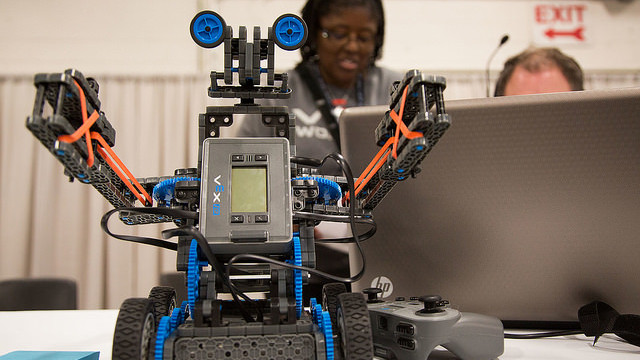
A sample robot that students will be building and programming to accomplish a variety of tasks. Photo: VEX Robotics
Wayjay’s true anchor in Liberia, however, is the Nyonblee Cares Foundation, an NGO founded by Grand Bassa’s first female senator, Nyonblee Karnga-Lawrence.
The senator made her World Wide Academy school available for Wahjay to operate in, along with connecting Giah with key individuals. Such connections led to Giah persuading Ministry of Education officials to allow the program in the Buchanan Demonstration Elementary School.
Karnga-Lawrence has also recruited her peers to push the STEM agenda forward in Liberian schools. At the launch program held last Wednesday at the Buchanan City Hall, about ten lawmakers – mostly senators – attended and made financial pledges to the program. More importantly for the sustainability of the program, Senate Pro-tempore Armah Jallah vowed to sponsor a bill promoting STEM education in Liberian schools.
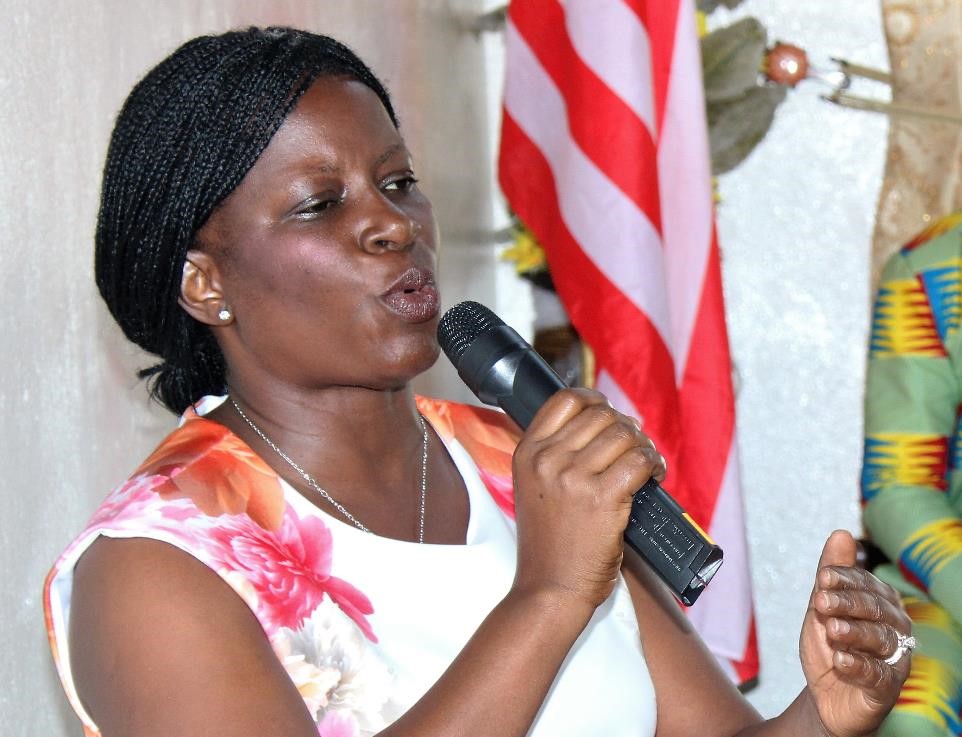
Senator Nyonblee Karnga-Lawrence, founder of the Nyonblee Cares Foundation, voices her support for Wahjay-STEM. Photo: Jefferson Krua
While the current program has been funded by multiple organizations and individuals, Giah said she has used US$ 4,000 of her own money. Wahjay has also benefited from the financial support of Lonestar Cell MTN, its first major funder.
“Lonestar understands that… this has been one of the more advanced programs to be brought to Liberia because it does not meet Liberia exactly where they are,†Giah said. “It meets them where they are and takes them where they should be in relation to the rest of the world.â€
To contact Wahjay, visit their website or send an email. Featured photo by Jefferson Krua
